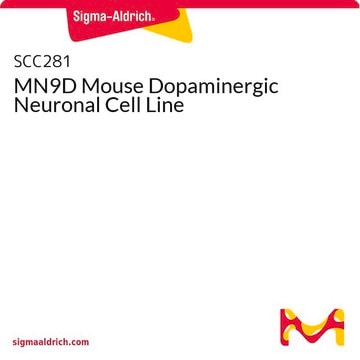SCC129
HT-22 Mouse Hippocampal Neuronal Cell Line
Mouse
Synonym(s):
HT22 Cell Line
Sign Into View Organizational & Contract Pricing
All Photos(2)
About This Item
UNSPSC Code:
41106514
eCl@ss:
32011203
NACRES:
NA.81
Recommended Products
product name
HT-22 Mouse Hippocampal Neuronal Cell Line, HT-22 mouse neuronal cell line is a valuable cell model for studies of glutamate-induced toxicity in neuronal cells.
biological source
mouse
Quality Level
technique(s)
cell based assay: suitable
shipped in
dry ice
General description
Glutamate is a major excitatory neurotransmitter used as a signaling molecule between nerve cells and is involved in most aspects of normal brain function including cognition, learning and memory. Various glutamate receptors are found throughout the brain and include NMDA, AMPA/kainate and metabotropic receptors (mGluR). Normal glutamate levels are essential for normal brain function, however high levels may result in over-excitation of nerve cells, leading to eventual cell damage and/or cell death. Glutamate-induced cytotoxicity has been implicated in neurodegenerative disorders such as Alzheimer’s disease, Huntington’s disease and Parkinson’s disease along with other conditions including spinal cord injury and multiple sclerosis. Therapies that may inhibit or reduce the effects of glutamate activity are thus of great therapeutic interest.
HT-22 is an immortalized mouse hippocampal cell line subcloned from the HT-4 cell line . The parental HT-4 cell line was derived from the immortalization of mouse neuronal tissues with a temperature sensitive SV40 T-antigen . HT-22 is highly sensitive to glutamate and is thus frequently used as a model system to study glutamate-induced toxicity in neuronal cells.
Cell Line Description
Neural Lineage Cells
Application
EMD Millipore has a limited license to sell this product for research use only, and not for any commercial uses. Excluded commercial uses include without limitation manufacturing, providing a service, therapeutic, diagnostic and prophylactic uses, and any other commercial uses. Use of this product by a purchaser for any purpose other than for research is unauthorized and prohibited.
Inquiries about licensing for commercial or other uses should be directed to:
Office of Technology Development
The Salk Institute for Biological Studies
10010 North Torrey Pines Road
La Jolla, CA 92037
Phone: (858) 453-4100 extension 1278
Email: OTD@salk.edu
Inquiries about licensing for commercial or other uses should be directed to:
Office of Technology Development
The Salk Institute for Biological Studies
10010 North Torrey Pines Road
La Jolla, CA 92037
Phone: (858) 453-4100 extension 1278
Email: OTD@salk.edu
Research Category
Neuroscience
Toxicity
Neuroscience
Toxicity
Quality
• Each vial contains ≥ 1X106 viable cells.
• Cells are tested negative for infectious diseases by a Mouse Essential CLEAR panel by Charles River Animal Diagnostic Services.
• Cells are verified to be of mouse origin and negative for inter-species contamination from rat, chinese hamster, Golden Syrian hamster, human and non-human primate (NHP) as assessed by a Contamination Clear panel by Charles River Animal Diagnostic Services.
• Cells are negative for mycoplasma contamination.
• Cells are tested negative for infectious diseases by a Mouse Essential CLEAR panel by Charles River Animal Diagnostic Services.
• Cells are verified to be of mouse origin and negative for inter-species contamination from rat, chinese hamster, Golden Syrian hamster, human and non-human primate (NHP) as assessed by a Contamination Clear panel by Charles River Animal Diagnostic Services.
• Cells are negative for mycoplasma contamination.
Storage and Stability
Store in liquid nitrogen. The cells can be cultured for at least 10 passages after initial thawing without significantly affecting the cell marker expression and functionality.
Storage Class Code
12 - Non Combustible Liquids
WGK
WGK 2
Flash Point(F)
Not applicable
Flash Point(C)
Not applicable
Certificates of Analysis (COA)
Search for Certificates of Analysis (COA) by entering the products Lot/Batch Number. Lot and Batch Numbers can be found on a product’s label following the words ‘Lot’ or ‘Batch’.
Already Own This Product?
Find documentation for the products that you have recently purchased in the Document Library.
Oliwia Koszła et al.
Molecules (Basel, Switzerland), 27(7) (2022-04-13)
Neurodegenerative and mental diseases are serious medical, economic and social problems. Neurodegeneration is referred to as a pathological condition associated with damage to nerve cells leading to their death. Treatment of neurodegenerative diseases is at present symptomatic only, and novel
Yubo Cheng et al.
eLife, 9 (2020-11-17)
The functional importance of many non-coding RNAs (ncRNAs) generated by repetitive elements and their connection with pathologic processes remains elusive. B2 RNAs, a class of ncRNAs of the B2 family of SINE repeats, mediate through their processing the transcriptional activation
Kyung-Ran Kim et al.
Experimental & molecular medicine, 53(7), 1134-1147 (2021-07-09)
Calbindin, a major Ca2+ buffer in dentate granule cells (GCs), plays a critical role in shaping Ca2+ signals, yet how it regulates neuronal function remains largely unknown. Here, we found that calbindin knockout (CBKO) mice exhibited dentate GC hyperexcitability and
J B Davis et al.
Brain research, 652(1), 169-173 (1994-07-25)
A neuronal cell line, HT-22, is sensitive to glutamate cytotoxicity via a non-receptor mediated oxidative pathway. 12-O-tetradecanoylphorbol-13-acetate (TPA), an activator of protein kinase C, blocks this glutamate-induced cell death. Down-regulation of protein kinase C eliminates the protection against glutamate cytotoxicity
Brian K A Choi et al.
PloS one, 14(8), e0220056-e0220056 (2019-08-02)
Abortive cell cycle (ACC) re-entry of apoptotic neurons is a recently characterized phenomenon that occurs after central nervous system (CNS) injury or over the course of CNS disease. Consequently, inhibiting cell cycle progression is neuroprotective in numerous CNS pathology models.
Our team of scientists has experience in all areas of research including Life Science, Material Science, Chemical Synthesis, Chromatography, Analytical and many others.
Contact Technical Service







